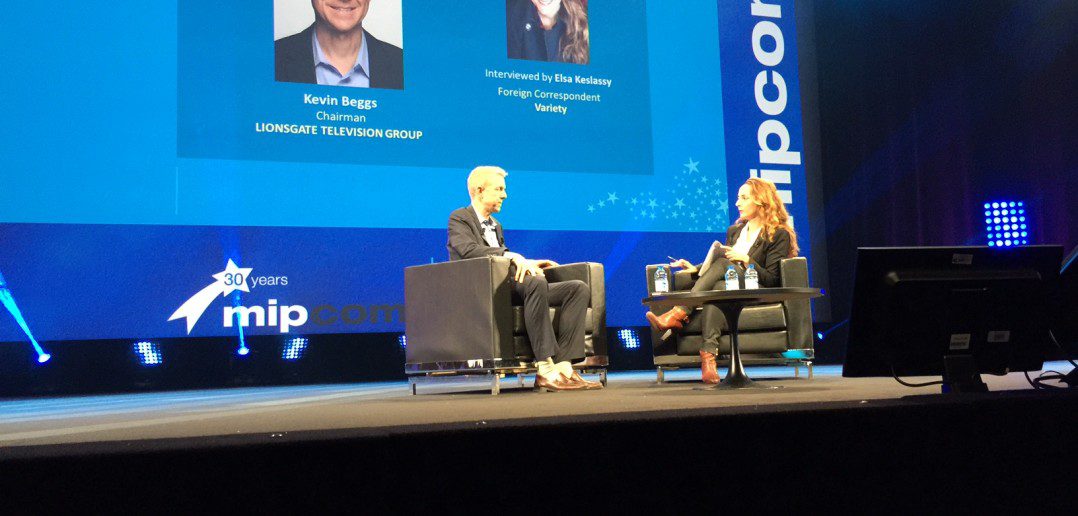From Mad Men to Orange is the New Black, Weeds to Manhattan, Lionsgate has become one of the power players in original television drama – even if it’s not delivered through a traditional television broadcaster. Kevin Beggs, chairman of Lionsgate Television Group, talked about the company’s strategy in this morning’s Film & TV Crossroads keynote at MIPCOM. He was interviewed on-stage by Elsa Keslassy, foreign correspondent for Variety.
He started by talking about international markets, and their importance to Lionsgate, to the point where the likely international audience is a key factor in whether it goes ahead or cans certain show ideas. « Certain shows we can’t really get behind, because the international won’t be there, » he said. Orange Is The New Black was one example of a show it thought would do well, based on the past performance of Weeds. And Lionsgate is also putting a « high priority » on finding coproductions in markets like the UK and France, with local writers and talent.
He talked about plans to work with Ylvis – of viral YouTube video The Fox fame – before talking about the relationship with network AMC, which grew around Mad Men, which became a pivotal show for both companies. And he stressed the wide nature of the company’s partnerships, from Showtime to Hulu and Netflix. « We hope to be the first for a lot of buyers. We also have a lot of repeat business, » he said. « They feel pretty good about you if you’re delivering a hit, and they ask you to bring more. »
How is it dealing with Netflix versus AMC? The latter is ad-supported, so there are running times of 42-43 minutes for a drama with ad breaks. Streaming firms obviously have no advertising obligations, and a much longer running time with no breaks. « With Orange Is The New Black, the storytelling is very different, » he said, of the show’s ability to take « digressions » in episodes, telling stories in a « much more serialised, novelised fashion, which isn’t pushing you to have a really dramatic scene before each commercial break, to ensure viewers come back« .
Is the creative freedom welcome on a platform like Netflix? « Netflix is banking on experienced creators, filmmakers, people that have a track record that actually dovetails into their entire algorithm. They’re interested in things that already have some value to their customer base, » he said. « They’re not taking as many chances on first-time TV writers or showrunners, that a network by definition has to do much more. A network is churning out many more series, so far, than Netflix is doing, so they have to inherently maybe take a lot more risks… Netflix is very targeted, picking things that they already know should work. By definition, I don’t think they would ever go into a process being micro-managers. »
Could Lionsgate have sold Orange Is The New Black to a traditional network? Maybe a cable network, he admitted, but the nature of the storytelling would have been different. How do production budgets compare on Netflix? « They’re comparable with their premium competitors, the HBOs, the Showtimes, the Starzs of the world, » he said, before being pressed for more details on the figures involved. « A range? It’s high, I’ll say that! Orange Is The New Black is an expensive show: it costs a lot to make. That’s the range I’m going to give you! But worth every penny. »
What does Beggs think of the model for selling shows skipping the pilot stage? « We’re big believers in the straight-to-series model, » he said, suggesting that the economics of pilots can be challenging. « We’re focused on getting things out of development and into production, so a straight-to-series model is very attractive. » But Lionsgate is flexible: The Royals, its new show starring Elizabeth Hurley, was a script, then a pilot before it became a full series, for example. « It’s not for everybody, and certain shows really require a pilot more than others, » he said.
What is Lionsgate up to in Asia? It’s building an Asian business through a joint venture to provide channels, and putting shows like Orange Is The New Black on local digital services like Youku in China. « We’re developing a couple of shows that could find their way into production in Asia, now. It’s a priority for the company, » he said, before talking about wider growth for Lionsgate, and the way the firm has built its team « brick by brick » over the last decade. But where will the next big growth come from?
« There’s gonna be many more streaming players than there are today. In two years there’ll be six or seven legitimate players sitting here rather than three or four. Maybe more than that, » he said. « On a pay basis you don’t need that many subscribers to get you to breakeven… You’re going to see big brands jumping into that. I think the brands are going to follow where the audiences lie. If traditional 30 or 60-second commercials are less popular, they’re gonna want to get inside shows that people are talking about. And a lot of those shows are going into these streaming and premium environments. » He noted that brands are calling Lionsgate regularly about Orange Is The New Black, for example: the company will sit down with Netflix to discuss what’s possible on that front.
To finish up, he talked about the third season of Orange Is The New Black. « Rest assured, it’ll be great: it’ll be as good or better than the first two series, » he said, while declining to spill plot details. And the final episodes of Mad Men? « I haven’t seen anything, and I probably won’t see anything until it airs, because I’d be too excited and want to talk about it! »




